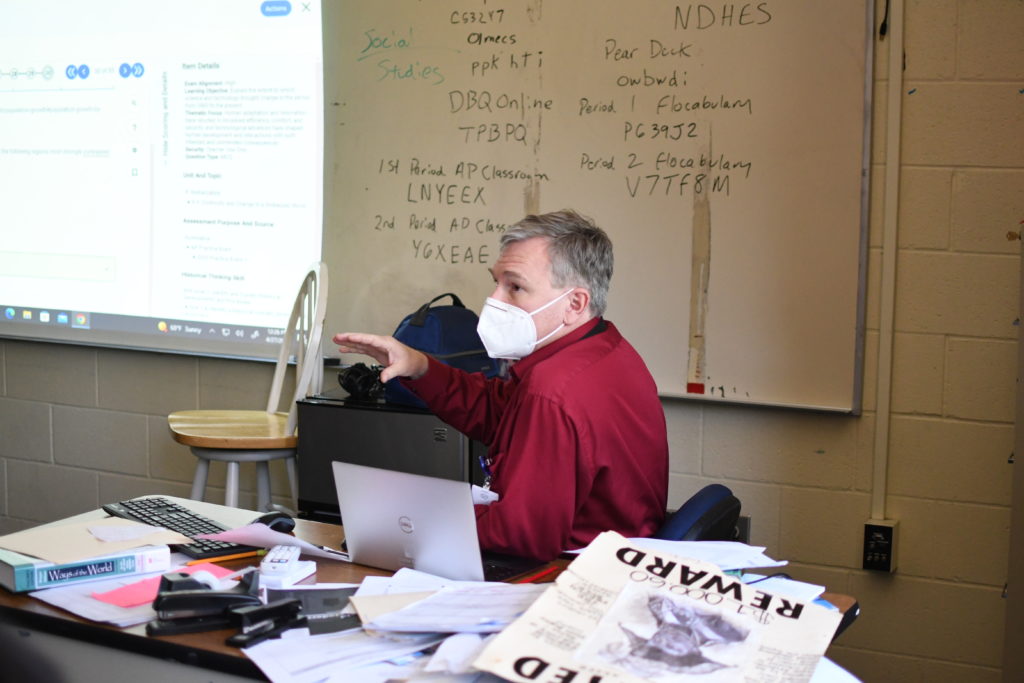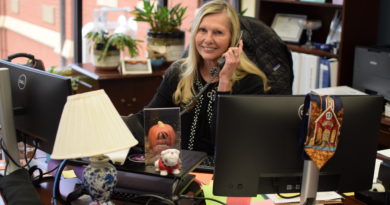Helm’s headlining stories
When Arnold Schwarzenegger finished voting for himself for governor of California in 2003, news organizations came to hear him speak. CNN cameraman Ron Helm got there before all the others and extended his microphone to reach just above Schwarzenegger’s head. But as more news organizations arrived, they too extended out their microphones. Helm’s microphone was at the bottom of the long extended pole and holding up all the other microphones. He buckled under all the weight, and in one swift, silent motion he smacked Schwarzenegger in the head with his microphone.
Helm worked in the Atlanta CNN headquarters as a video and photojournalist for 18 years before becoming a world history teacher at Cedar Shoals — the school he graduated from. For most of his career, Helm covered news in the White House while also traveling across the U.S covering celebrities, conventions, the aftermath of hurricanes, oil spills and even 9/11. When his students are lucky, Helm shares funny experiences he had as a cameraman.

Helm once served as the designated sound man for CNN during an interview with Samuel L. Jackson. The interview took place at a golf course, which unfortunately was directly below planes flying to and from the international airport. The noise caused Helm to stop the interview multiple times, but after several attempts, Helm heard Jackson muttering into the lavalier microphone attached to his shirt.
“I started hearing Samuel L. Jackson muttering about how he was gonna kill the sound guy and bury his body and nobody will ever find it. So, all of a sudden I just sort of started laughing and then the producer, the recorder and photographer were all looking at me like ‘I don’t understand what’s going on,’ but I’m getting a personal performance, about how he is going to kill me and hide my body,” Helm said.
His experiences bring an interesting perspective to media portrayal and history. When Helm shows students news pieces in his world history class, he includes different perspectives to help students understand that media is not the end-all truth.
“You don’t know what’s going on in their mind or what is motivating them (sources). Journalism is a snapshot. Just a moment of that person’s life, so you have to look at it in that sense,” Helm said.
Helm says that meeting Ray Liotta, who is often portrayed as a gruff mobster in movies, taught him to never judge immediately. Helm had seen some of his movies before, but he knew that he was in the movie “Muppets from Space.” Helm was wrapping up equipment from the interview when he spoke to Liotta and got an unexpected response.

“I just said haphazardly after the interview was over, ‘I think it’s really cool. You got to work with the Muppets.’ And here’s a guy where basically his whole career has been mobster type and everything like that, but he turned into a 5 year old kid and told me all the coolest things about the Muppets. I was just sitting there going, ‘That’s a completely different side of him that you don’t ever see.’ He’s always an angry mobster, but he was as giddy as anyone,” Helm said.
After CNN laid Helm off during the pandemic, Helm moved to Maryland where he attended school for teaching and real estate. Helm wanted to be a teacher to help the next generation understand the world they live in.
“Having traveled as much as I’ve traveled, there are a lot of people that have a very poor understanding of the world. I didn’t like that. Now, I’ll be the first to say I am not the most prolific teacher, I’m not the exciting one. But, I do my best to at least make sure that you walk away knowing a lot about something. I don’t think that my kids can walk away and go, ‘Well, I have an ignorance of the world,’” Helm said.
Helm does not just have the pleasure of experiencing fun interviews and events. He also covered some of America’s greatest tragedies like the Deepwater Horizon oil spill and Hurricane Katrina. Helm won an Emmy Award for covering 9/11 in Washington D.C. for CNN.
“I watched the second plane hit the building live. At that point, I knew what had to happen. I put down everything else. I slipped straight to work nowhere close to my shift. I just knew that I needed to be at CNN,” Helm said. “It was a madhouse. After I had worked an 11hour shift, as I was getting out my keys to open my front door, I heard the phone going off. I rushed through the house and grabbed the phone. It was my boss telling me that tomorrow I was to get up early, go to the car rental place and rent a car to drive to Washington D.C., so that’s what I did. On the 12th, I spent the day driving from Atlanta to Washington D.C. I drove by the Pentagon and 24 hours later, it was still on fire.”
Helm uses his experience covering 9/11 as an example of present-day history. He says that living history has taught his students things they cannot read. Working in media taught him about people’s perspectives, so he ensures that students see all viewpoints.

“There is no right or wrong. The world is gray. I don’t go in and advocate for one side. I try to sit there and tell you, ‘Hey there are different perspectives to everything.’ In World War I, we fought on the same side as the assassins, so look at Germany’s standpoint or Austria’s standpoint,” Helm said.
Covering 9/11 was not the most significant thing in Helm’s journalism career. He says simple stories like one about two volunteer firefighters come to mind the most. For that story, Helm says he was driving into a forest fire to take photos when he was stopped by an 18-wheeler oil truck blocking the road with two guys spraying the forest.
“They had hoses out and they’re spraying stuff and I’m like, ‘This doesn’t really look right.’ It turned out that they were two volunteer firefighters. They had taken the tanker, scrubbed it out, emptied it, filled it with water and were spraying back a backstop with water to get the fire to come out,” Helm said. “I remember asking the question, ‘Have you experienced fighting forest fires?’ He smiled, he’s covered in dirt and soot and he says ‘Yeah, all this week.’ I remember that. I remember the reaction, I remember his smile.”




